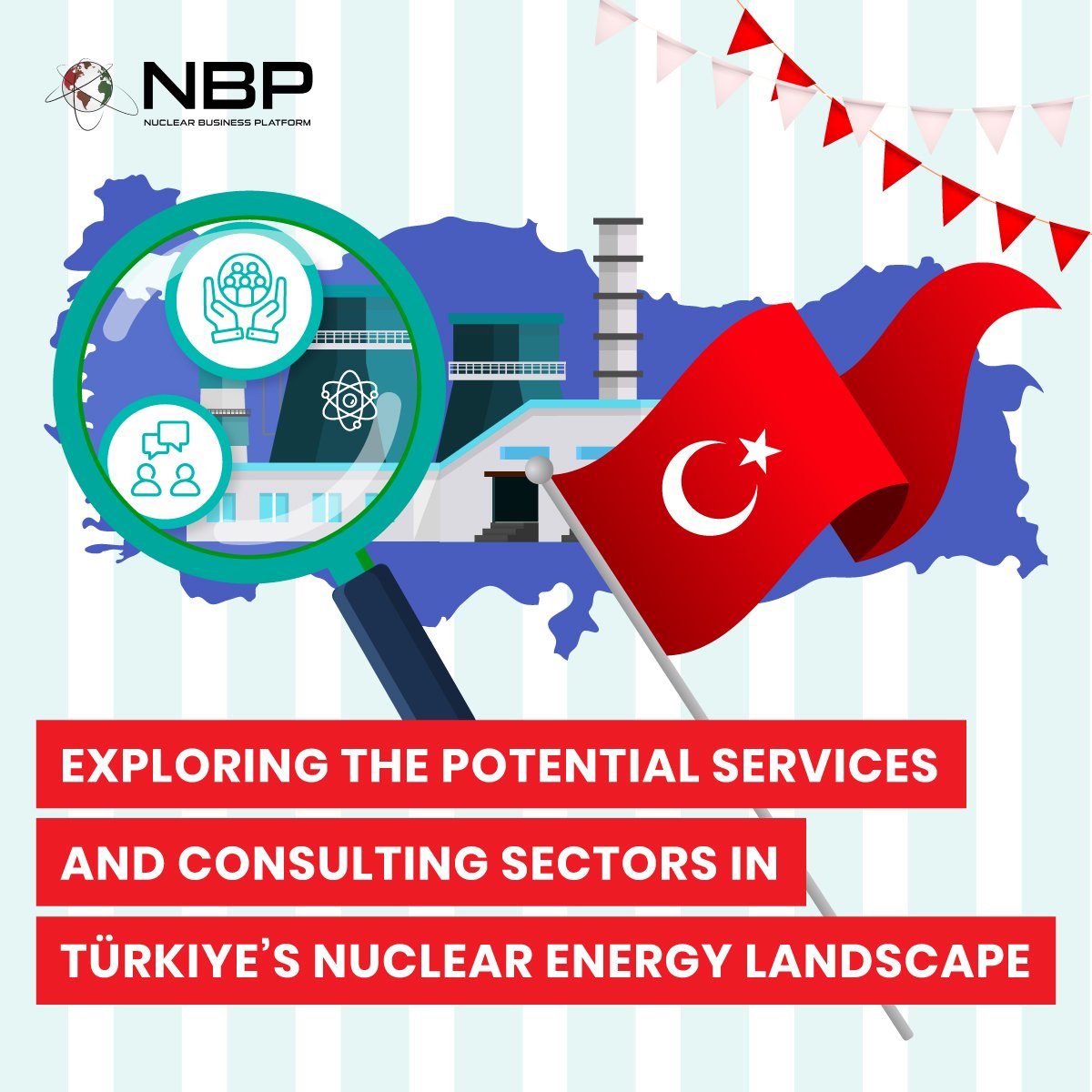Exploring the Potential Services and Consulting Sectors in Türkiye’s Nuclear Energy Landscape
Türkiye, with its flourishing economy and growing population, stands as a land of immense potential for energy investment. To meet its energy needs, Türkiye has embarked on an ambitious nuclear energy program, aiming to build three nuclear power plants (NPPs) with a total capacity of 14.3 GWe by 2030. This program offers a unique opportunity for foreign investors to enter an emerging market, and to establish long-term partnerships with Türkiye in the nuclear energy sector.
Türkiye’s nuclear energy program is based on three NPP projects, each involving different technologies and vendors. The first NPP, Akkuyu, is being constructed by a Russian consortium led by Rosatom, and is expected to start operation in 2023. The second NPP, Sinop, is under the planning phase with ongoing discussions between Türkiye and both Russia, South Korea. The third NPP, İğneada, likewise is still in the planning stage, and the technology and vendor have not been decided yet. However, discussions are taking place with the People's Republic of China. Additionally, Türkiye is also engaging with the UK and USA to explore the adoption of small modular reactor (SMR) technology.
These projects create a huge demand for specialized services and consulting related to various aspects of nuclear energy development and operation. Türkiye’s business services and consultation endeavors can seize this opportunity by offering their services and consulting in the following areas:
Consulting Services: Consulting services can assist in developing Türkiye’s nuclear energy portfolio, optimizing the supply chain, improving capabilities, and fostering regional cooperation, even with the involvement of global players. This would help Türkiye realize its nuclear potential and vision, as well as to create strategic alliances and synergies with foreign investors. Türkiye might consider technical advisory services for the Sinop and İğneada facilities. The primary opportunities will involve the provision of engineering, legal, and regulatory consulting services.
NPPs Operational Supporting services: Once an NPP is operational, it requires continuous maintenance, security, and training services to ensure its safe and reliable performance. developing a robust domestic sector to provide these services ensures the reliable performance of nuclear facilities and optimizes operational efficiency. Additionally, If the İğneada plant is developed, companies could potentially find opportunities. Turkish companies in the area are actively searching for component manufacturers to become partners in joint ventures for the supply and contracting aspects of both ongoing and upcoming projects. It is probable that the majority of these opportunities will be centered around component manufacturing.
Licensing Support services: Navigating the complex and lengthy licensing process for NPP projects requires expertise. Licensing support services can showcase their procedures that can help prepare documentation, facilitate communication with relevant agencies, and reduce risks and uncertainties.
Safety Enhancement services: Ensuring the utmost safety is paramount in the nuclear industry. Türkiye can develop its expertise in safety assessment, implementing international best practices and adhering to regulatory standards. Domestic entities can offer safety consulting services, supporting the nuclear industry's growth while prioritizing public safety.
Environmental Impact Mitigations services: Balancing the environmental impacts of nuclear energy is crucial. Türkiye can focus on environmental impact studies, waste management, and biodiversity protection. By offering consulting services in these areas, experts can guide Türkiye's efforts to achieve sustainability goals.
Legal and Dispute Resolution services: As the sector grows, the potential for legal disputes and conflicts also increases. The Establishment of legal and nuclear dispute resolution sectors can help manage these issues, ensuring constructive conflict resolution while adhering to international norms as well as an opportunity for making profits.
Nuclear Emergency Preparedness: Developing robust capabilities in nuclear emergency preparedness and response is essential, especially considering Türkiye's susceptibility to natural disasters. This directs to the potential of establishing the sectors dedicated to risk assessment, contingency planning, crisis management, and communication strategies to ensure readiness and safety.
Nuclear Public Communication and Education services: Türkiye needs to enhance its public communication and education on nuclear energy issues, such as benefits, risks, safety, security, and sustainability. The magnificent opportunities in this sector can provide services related to nuclear public communication and education such as awareness campaigns, stakeholder engagement, media relations, social media platforms, educational materials, and training programs.
Nuclear Decommissioning and Waste Management services: Türkiye will eventually have to decommission its nuclear facilities and manage its radioactive waste safely and responsibly. Therefore, there are opportunities for services related to nuclear decommissioning and waste management such as planning, engineering, dismantling, decontamination, remediation, storage, disposal, and monitoring.
Nuclear Security Services: As nuclear energy sectors face threats such as terrorism, sabotage, cyberattacks, and theft, businesses specializing in nuclear security risk assessment, physical protection, detection and response, information security, and personnel reliability have a promising future in the Turkish nuclear market.
Nuclear Fuel Cycle Services: Türkiye does not have significant domestic uranium resources or enrichment capabilities, so it relies on importing nuclear fuel from abroad. In this case, the potential for services related to the supply chain of nuclear fuel cycle components such as uranium mining, conversion, enrichment, fabrication, transportation, storage, reprocessing, and disposal.
It is clear that Türkiye's nuclear energy sector is not just a realm of opportunities for foreign investors; it also offers a wealth of prospects for domestic growth. By nurturing and developing these potential services and consulting sectors, Türkiye can harness the full potential of its nuclear energy program, bolster energy security, and contribute to economic development while setting the stage for a sustainable and innovative future. The path to nuclear prosperity is not limited to foreign entities; it is an arena where Türkiye can shine and prosper.
Opportunities in the Turkish nuclear market will be discussed during the Türkiye NBP 2023 conference and exhibition which will take place 6-8 November in Antalya. This industry meeting is hosted by Nükleer Teknik Destek Anonim Şirketi (NÜTED A.Ş.). An exclusive technical site-visit to the Akkuyu nuclear plant site is also scheduled as part of Türkiye NBP 2023
For more information and to download the detailed meeting agenda visit - www.nuclearbusiness-platform.com/turkiye/tnbp-2023



